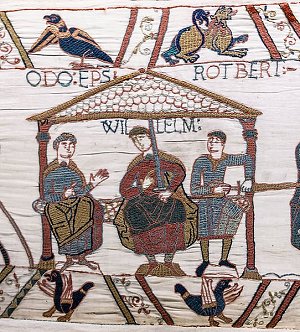yeovil people
robert, count of mortain
Tenant-in-Chief of Kingston Manor
 Robert,
Count of Mortain
(c. 1031–1090)
was a Norman
nobleman and the
half-brother of
William the
Conqueror and
brother of Odo.
He was one of
the known
participants at
the Battle of
Hastings in 1066
and, thanks to
his share in the
spoils of the
invasion
campaign, by the
time of the
Domesday Book in
1086 he was one
of the greatest
landholders in
England as
tenant-in-chief
in twenty
counties, with a
total of 797
manors.
His lands in
Somerset,
including
Yeovil's future
Manor of
Kingston, have
been calculated
as equal in
value to one
tenth of the
county's total
assessment. The
overall worth of
his estates was
£2,100.
Robert,
Count of Mortain
(c. 1031–1090)
was a Norman
nobleman and the
half-brother of
William the
Conqueror and
brother of Odo.
He was one of
the known
participants at
the Battle of
Hastings in 1066
and, thanks to
his share in the
spoils of the
invasion
campaign, by the
time of the
Domesday Book in
1086 he was one
of the greatest
landholders in
England as
tenant-in-chief
in twenty
counties, with a
total of 797
manors.
His lands in
Somerset,
including
Yeovil's future
Manor of
Kingston, have
been calculated
as equal in
value to one
tenth of the
county's total
assessment. The
overall worth of
his estates was
£2,100.
In early 1066, Robert was present at both the first council, that of William's inner circle, and the second larger council held to discuss the Duke's planned conquest of England. Robert provided 120 ships of the invasion fleet and was present at the following Battle of Hastings in 1066. The illustration above, from the Bayeux Tapestry, shows Robert seated at right with his brothers William and Odo at a dinner at Pevensey on the day of the landing in England.
In 1069 he is known to have led an army against a force of Danes in Linsey but there is little mention of him thereafter. He administered most of his southwestern holdings from Launceston in Cornwall and Montacute in Somerset, just four miles west of Yeovil, but he seems to have been something of an absentee landholder, preferring to spend the majority of his time in Normandy.
Together with
his brother Odo
he participated
in a revolt in
1088 against
William II but
was later
pardoned. On 8
December 1090
Robert died and
was buried at
the Abbey of
Grestain,
Normandy, near
his father. He
was succeeded by
his son,
William, Count
of Mortain,
who became
tenant-in-chief
of his father's
Yeovil holdings.